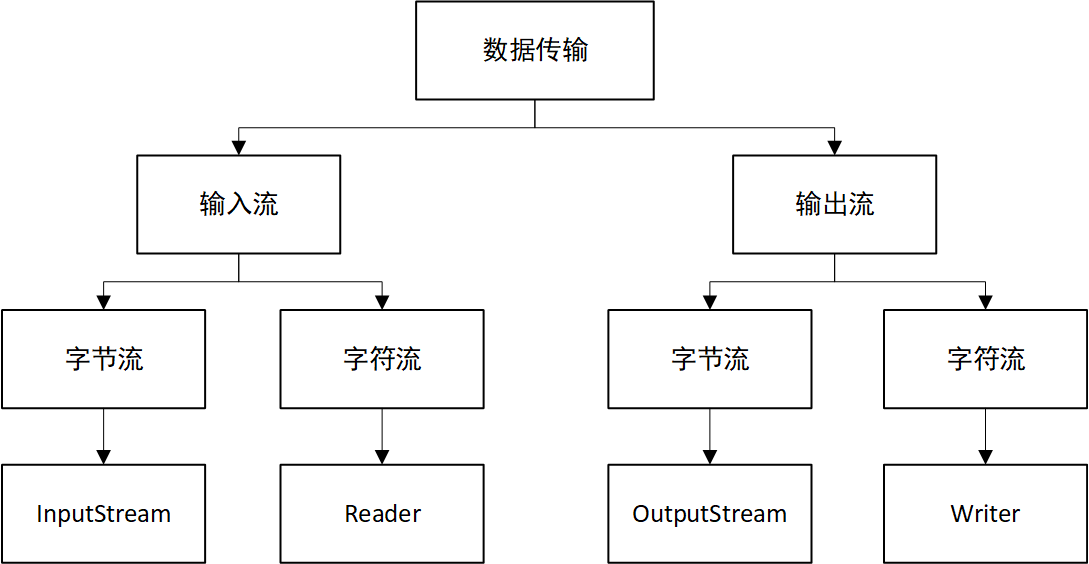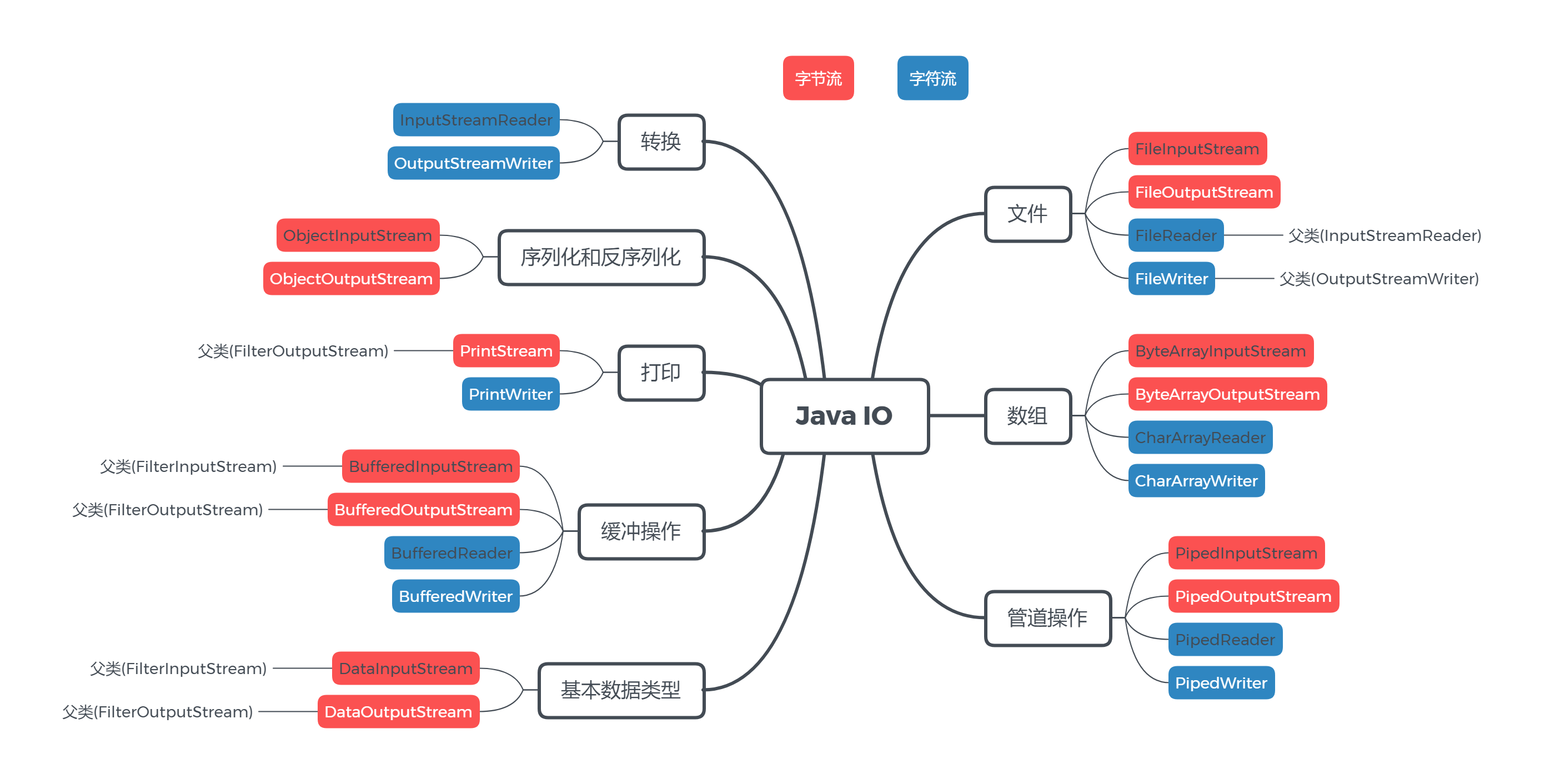Java IO入門
阿新 • • 發佈:2019-11-25
目錄
- 一. 資料來源(流)
- 二. 資料傳輸
- 三. 總結
我們從兩個方面來理解Java IO,資料來源(流)、資料傳輸,即IO的核心就是對資料來源產生的資料進行讀寫並高效傳輸的過程。
一. 資料來源(流)
資料來源可以理解為水源,指可以產生資料的事物,如硬碟(文件、資料庫等檔案...)、網路(填寫的form表單、物聯感知資訊..),在Java中有對檔案及資料夾操作的類File,常用的檔案方法如下:
public static void printFileDetail(File file) throws IOException { System.out.println("檔案是否存在:" + file.exists()); if(!file.exists()){ System.out.println("建立檔案:" + file.getName()); file.createNewFile(); } if(file.exists()){ System.out.println("是否為檔案:" + file.isFile()); System.out.println("是否為資料夾:" + file.isDirectory()); System.out.println("檔名稱:" + file.getName()); System.out.println("檔案構造路徑:" + file.getPath()); System.out.println("檔案絕對路徑:" + file.getAbsolutePath()); System.out.println("檔案標準路徑:" + file.getCanonicalPath()); System.out.println("檔案大小:" + file.length()); System.out.println("所在資料夾路徑:" + file.getParentFile().getCanonicalPath()); System.out.println("設定為只讀檔案:" + file.setReadOnly()); } } public static void main(String[] args) throws IOException { File file = new File("./遮天.txt"); printFileDetail(file); }
結果如下:
檔案是否存在:false
建立檔案:遮天.txt
是否為檔案:true
是否為資料夾:false
檔名稱:遮天.txt
檔案構造路徑:.\遮天.txt
檔案絕對路徑:E:\idea-work\javase-learning\.\遮天.txt
檔案標準路徑:E:\idea-work\javase-learning\遮天.txt
檔案大小:0
所在資料夾路徑:E:\idea-work\javase-learning
設定為只讀檔案:true二. 資料傳輸
資料傳輸的核心在於傳輸資料來源產生的資料,Java IO對此過程從兩方面進行了考慮,分別為輸入流和輸出流,輸入流完成外部資料向計算機記憶體寫入,輸出流則反之。
而針對輸入流和輸出流,Java IO又從位元組和字元的不同,再次細分了位元組流和字元流。

說明:Java中最小的計算單元是位元組,沒有字元流也能進行IO操作,只是因為現實中大量的資料都是文字字元資料,基於此單獨設計了字元流,使操作更簡便。
4個頂層介面有了,接下來Java IO又從多種應用場景(包括了基礎資料型別、檔案、陣列、管道、列印、序列化)和傳輸效率(緩衝操作)進行了考慮,提供了種類眾多的Java IO流的實現類,看下圖:

當然我們不用都記住,而實際在使用過程中用的最多的還是檔案類操作、轉換類操作、序列化操作,當然在此基礎上我們可以使用Buffered來提高效率(Java IO使用了裝飾器模式)。下面我們通過檔案拷貝來簡單說明一下主要類的使用
/**
* 檔案拷貝(所有檔案,文件、視訊、音訊、可執行檔案...),未使用緩衝
* @param sourceFileName 原始檔路徑
* @param targetFileName 拷貝後目標檔案路徑
* @throws IOException IO異常
*/
public static void slowlyCopyFile(String sourceFileName, String targetFileName) throws IOException{
//獲取位元組輸入流
FileInputStream fileInputStream = new FileInputStream(sourceFileName);
//File targetFile = new File(targetFileName);
//獲取位元組輸出流
FileOutputStream fileOutputStream = new FileOutputStream(targetFileName);
byte[] bytes = new byte[1024];
//當為-1時說明讀取到最後一行了
while ((fileInputStream.read(bytes)) != -1) {
fileOutputStream.write(bytes);
}
fileInputStream.close();
fileOutputStream.close();
}
/**
* 檔案拷貝(所有檔案,文件、視訊、音訊、可執行檔案...),使用緩衝
* @param sourceFileName 原始檔路徑
* @param targetFileName 拷貝後目標檔案路徑
* @throws IOException IO異常
*/
public static void fastCopyFile(String sourceFileName, String targetFileName) throws IOException{
//獲取位元組輸入流
FileInputStream fileInputStream = new FileInputStream(sourceFileName);
//緩衝位元組輸入流
BufferedInputStream bufferedInputStream = new BufferedInputStream(fileInputStream);
//獲取位元組輸出流
FileOutputStream fileOutputStream = new FileOutputStream(targetFileName);
//緩衝位元組輸出流
BufferedOutputStream bufferedOutputStream = new BufferedOutputStream(fileOutputStream);
byte[] bytes = new byte[1024];
//當為-1時說明讀取到最後一行了
while ((bufferedInputStream.read(bytes)) != -1) {
bufferedOutputStream.write(bytes);
}
bufferedOutputStream.flush();
bufferedInputStream.close();
fileInputStream.close();
bufferedOutputStream.close();
fileOutputStream.close();
}
public static void main(String[] args) throws IOException {
long startTime = System.currentTimeMillis();
//檔案215M
slowlyCopyFile("D:\\Download\\jdk-8u221.exe","D:\\jdk-8u221.exe");//執行:1938ms
fastCopyFile("D:\\Download\\jdk-8u221.exe","D:\\jdk-8u221.exe");//執行:490ms
System.out.println(System.currentTimeMillis() - startTime);
} /**
* 文字檔案拷貝,不使用緩衝
* @param sourceFileName 原始檔路徑
* @param targetFileName 拷貝後目標檔案路徑
* @throws IOException IO異常
*/
public static void slowlyCopyTextFile(String sourceFileName, String targetFileName) throws IOException {
FileReader fileReader = new FileReader(sourceFileName);
FileWriter fileWriter = new FileWriter(targetFileName);
int c;
while ((c = fileReader.read()) != -1) {
fileWriter.write((char)c);
}
fileReader.close();
fileWriter.close();
}
/**
* 文字檔案拷貝,使用緩衝
* @param sourceFileName 原始檔路徑
* @param targetFileName 拷貝後目標檔案路徑
* @throws IOException IO異常
*/
public static void fastCopyTextFile(String sourceFileName, String targetFileName) throws IOException {
FileReader fileReader = new FileReader(sourceFileName);
BufferedReader bufferedReader = new BufferedReader(fileReader);
FileWriter fileWriter = new FileWriter(targetFileName);
BufferedWriter bufferedWriter = new BufferedWriter(fileWriter);
String str;
while ((str = bufferedReader.readLine()) != null) {
bufferedWriter.write(str + "\n");
}
bufferedReader.close();
fileReader.close();
bufferedWriter.close();
fileWriter.close();
}
public static void main(String[] args) throws IOException {
long startTime = System.currentTimeMillis();
//檔案30M
slowlyCopyTextFile("D:\\Download\\小說合集.txt","D:\\小說合集.txt");//3182ms
fastCopyTextFile("D:\\Download\\小說合集.txt","D:\\小說合集.txt");//1583ms
System.out.println(System.currentTimeMillis() - startTime);
}三. 總結
本文主要對Java IO相關知識點做了結構性梳理,包括了Java IO的作用,資料來源File類,輸入流,輸出流,位元組流,字元流,以及緩衝流,不同場景下的更細化的流操作型別,同時用了一個檔案拷貝程式碼簡單地說明了主要的流操作,若有不對之處,請批評指正,望共同進步,謝謝
